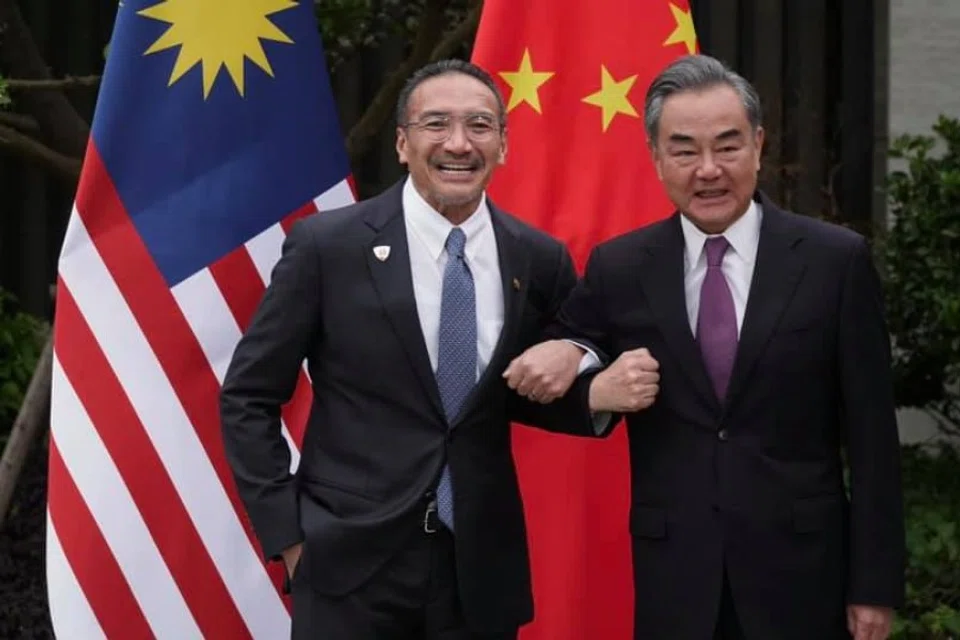Malaysia's 'big brother' controversy and ASEAN's dilemma
Malaysian Foreign Minister Hishammuddin Hussein sparked a reaction when he referred to China's Foreign Minister Wang Yi as "big brother", as some quarters in Malaysia felt that the term was overly deferential. Chinese academic Zhang Jingwei looks at how ASEAN countries are stuck between a rock and hard place in their relations with China and the US.

Addressing someone as "big brother" (大哥) in diplomatic circles could have made a nice story, but it has sparked controversy instead.
At a press conference on 1 April, Malaysian Foreign Minister Hishammuddin Hussein said that China and Malaysia are "one family", and referred to China's Foreign Minister Wang Yi as "big brother", to which Wang Yi responded: "We are brothers."
Hishammuddin's comment sparked a major reaction in Malaysia, with some feeling that he was "currying favour" with China. Malaysia's opposition leader Anwar Ibrahim even called for a public apology from Hishammuddin, while some media also dug up the family relationship between Hishammuddin and former Malaysian Prime Minister Najib Razak - prosecuted for corruption - casting doubt on Hishammuddin's character and his motives. Former Malaysian Foreign Minister Anifah Aman called it a "diplomatic faux pas". However, Hishammuddin also had supporters - the Malaysian Chinese Association said that the comment was a sign of the close ties between China and Malaysia.

The under-fire Hishammuddin posted several tweets to explain that he called Wang Yi "big brother" as a form of respect for Wang's age and seniority, and he was not referring to bilateral relations. He said, "Being respectful does not signify weakness."
Malaysia will not change its approach to China because of it, nor will its national interests be damaged, much less become China's "puppet", as Anwar says.
Malaysia and ASEAN sensitive to China's rising influence
Views differ on what diplomatic language should be. Some feel that in a public diplomatic exchange, the safest approach is to use polite but boring diplomatic language. Others feel that a charismatic diplomat would have their own personal style of expression. Of course, in big country diplomacy, there is also no lack of intense arguing that goes beyond diplomatic practice, as happened with the explosive public exchange between Chinese and US diplomatic officials in Alaska recently.
Diplomacy has its protocols, but there is no fixed format in how diplomats express themselves. There is actually no need to read too much into Hishammuddin calling Wang "big brother". Malaysia will not change its approach to China because of it, nor will its national interests be damaged, much less become China's "puppet", as Anwar says.
On the contrary, what Hishammuddin said was helpful to Malaysia; it strengthened the friendly ties between China and Malaysia in a show of Malaysia and China's comprehensive strategic partnership, while boosting China's goodwill towards Malaysia. Being an Asian country, Malaysia probably also understands the culture of "brotherhood", and that even if "big brother" is raised to the national level, "brothers" also means an equal relationship.

Anwar's online comments show the complex feelings of Malaysia and ASEAN towards China. Apart from sovereignty disputes over some islands in the South China Sea, countries in the region have had mixed feelings about China's rise. They want to ride on China's economic growth, but are wary of China's expansion in the region, and are worried that China's strength, as well as the ethnic Chinese in the region, will pose some threat.
Southeast Asia is within the traditional sphere of influence of the US, but became the centre of the geopolitical tussle between China and the US during the Obama administration, when ASEAN countries, especially the Philippines and Vietnam, were clearly on the side of the US, putting China on the defensive.
Although Trump waged trade and tech wars against China to the extent of comprehensively decoupling from it and even established an anti-China Indo-Pacific strategy nearing the end of his term in office, the ASEAN countries remained unfazed.
Trump era pushed ASEAN countries towards China
During the Donald Trump era, China's relationship with ASEAN countries improved because of American unilateralism, and especially the US's withdrawal from the Trans-Pacific Partnership (TPP). In particular, the Philippines' Rodrigo Duterte administration even distanced itself from the US and drew closer to China.

Although Trump waged trade and tech wars against China to the extent of comprehensively decoupling from it and even established an anti-China Indo-Pacific strategy nearing the end of his term in office, the ASEAN countries remained unfazed. Instead, trade and economic relations between China and ASEAN countries grew closer, with both parties signing the Regional Comprehensive Economic Partnership (RCEP).
China's Belt and Road Initiative (BRI) is also advancing steadily in the Southeast Asia region. The former Najib Razak administration has always been a firm supporter of the BRI and strived to complete the projects. It was not until Najib's corruption cases came to light that Malaysia's trade and economic cooperation with China was dealt a blow. Even so, China-Malaysia relations moved forward with positive momentum.
Following the damage done by Trumpism, ASEAN countries are unwilling to choose between major powers China and the US. Singapore openly sent the signal that it will not pick a side; Hishammuddin calling China "big brother" can also be seen as another way of expressing his stance.
Be it in Malaysia or other ASEAN countries, disputes or even confrontation would erupt between the pragmatic camps that are unwilling to pick a side and the traditional pro-US camps.
ASEAN adopting wait-and-see approach with 'America is back'
However, Biden did declare that "America is back". He has inherited the Trump administration's Indo-Pacific strategy and even given it a more realist anti-China bent. From the EU to Japan, and Australia and India, the US has launched an intense counterattack against China from geopolitics to human rights issues. In the face of intensifying China-US competition, it is understandable that ASEAN countries, situated in the core region of the Indo-Pacific strategy, are feeling anxious or even fearful.
Be it in Malaysia or other ASEAN countries, disputes or even confrontation would erupt between the pragmatic camps that are unwilling to pick a side and the traditional pro-US camps. Anwar's criticism of Hishammuddin reflects the deep anxiety of the pro-US camp in Malaysia and other ASEAN countries.

Taking the Philippines as an example, Chinese vessels dropped anchor around Whitsun Reef in the South China Sea recently to avoid the winds and waves. While the Philippine defence secretary sent warning signals to China, the foreign affairs secretary emphasised friendly ties between China and the Philippines. In addition, with Japan's enthusiastic participation in the anti-China alliance consisting of the US, Japan, India and Australia, Indonesia is also facing a dilemma as Japan tries to pull it into the anti-China camp. As Biden's anti-China alliance expands, ASEAN countries will be further sandwiched between China and the US.
While ASEAN countries have their reservations about China, they have expectations for an America that is "back". Currently, the mentality of ASEAN countries is to observe the US's speech and behaviour and stand on the sidelines vis-à-vis China as it is unwise to be too close to either party. And this is the main reason why Hishammuddin's "big brother" remark has sparked such controversy.
Be it Malaysia or other ASEAN countries, and regardless of whether one belongs to the China school or the pro-US camp, one should not go to extremes or be wilful.

While the struggle between major powers is a dynamic process, the basic principles of cruel yet pragmatic international relations are driven by interests and backed up by countries' strength. Besides, the allies that the US has won over - be it the EU, Japan, or the four other countries of the Five Eyes alliance - are not firmly on the US's side either. As old problems such as Iran and North Korea's nuclear issues resurface, the US's anti-China alliance would be shaken up as well.
While it is true that Hishammuddin's "big brother" remark triggered a dispute in Malaysia, it cannot be blown out of proportion. Be it Malaysia or other ASEAN countries, and regardless of whether one belongs to the China school or the pro-US camp, one should not go to extremes or be wilful.
Related: Now more than ever, Southeast Asia values a firm American security presence | America needs to value Southeast Asia for its own sake, and not just as a tool to fight China | Amid domestic political change, Malaysia sticks to trusted formula for South China Sea disputes | SEA states have few options to mitigate escalating South China Sea tensions | China's Belt and Road Initiative faces huge challenges in Southeast Asia





![[Photos] Fact versus fiction: The portrayal of WWII anti-Japanese martyrs in Taiwan](https://cassette.sphdigital.com.sg/image/thinkchina/3494f8bd481870f7c65b881fd21a3fd733f573f23232376e39c532a2c7593cbc)